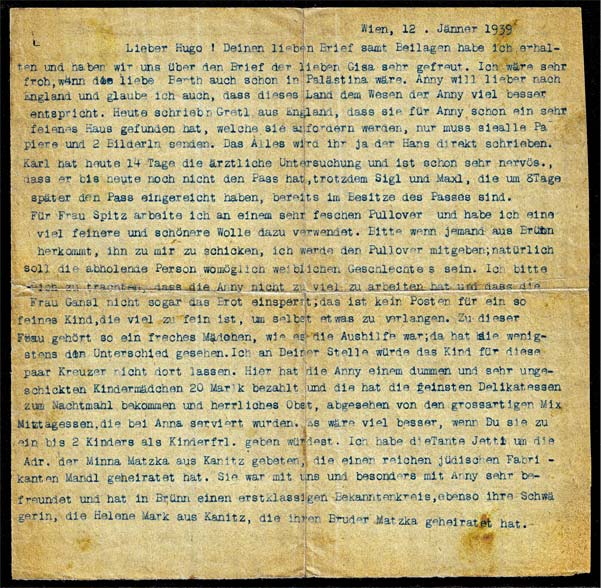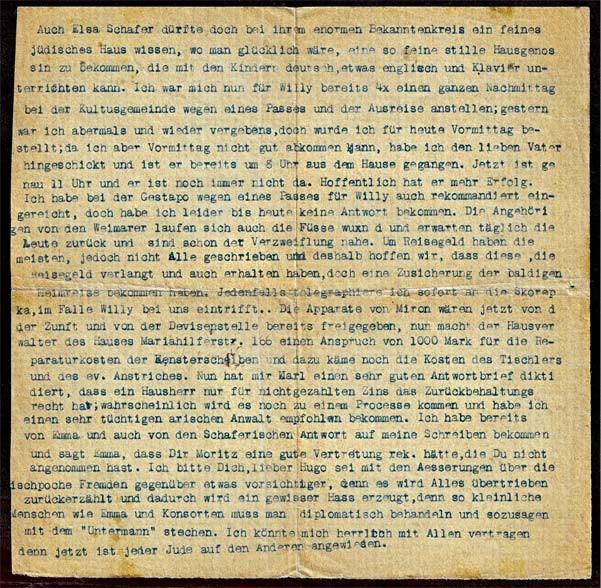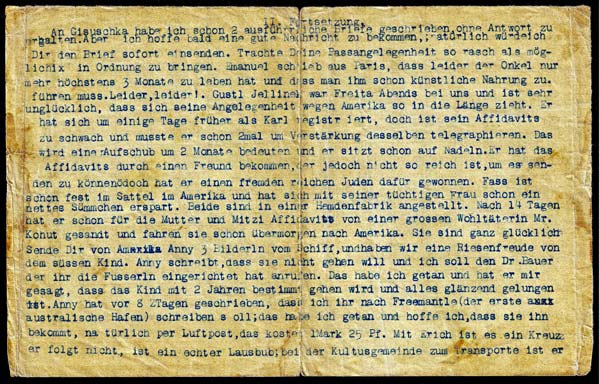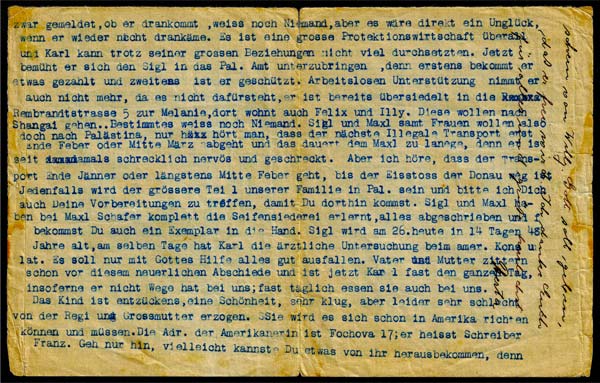

|
Author(s) / Origin of Letter
|
Recipient(s) / Relationship to Author(s) / Destination of Letter
|
Summary
|
|
Gisela Jellinek Schlesinger
Berta Jellinek (additional hand-written greetings) (see Oskar Jellinek’s bio) [Vienna, Austria] |
Hugo Jellinek (brother of GJS, cousin of BJ) |
Gisela writes mostly about her close family members’ emigration, including applications for passports, affidavits, visas and “illegal” transports to Mandate Palestine. She also describes her efforts to help her nephew, Willy Jellinek get out of Dachau, as well as her attempts to settle unjust claims in regard to vandalism during the Kristallnacht pogrom. Although Gisela expresses strong worry about her siblings, nieces and nephews, she does not even hint at her actions or concerns for her own, her spouse’s or her parents’ emigration. |
|
Vienna, January 12, 1939 Dear Hugo! I received your lovely letter with all the enclosures and we were all very happy about beloved Gisa’s [Gisella Nadja’s1] letter. I would be very happy if only dear Berth[a] were already in Palestine. Anny prefers to go to England and I believe, too, that this country goes better with Anny’s character. Today Gretl 2 wrote from England that she has already found a very nice house for Anny, whose owner is going to ask for her;3 she only has to send all her documents, including two photographs. Hans is certainly going to write directly to her about all the details. Karl4 will have his medical exam fourteen days from today, and he is already very nervous, because he still has not received [his] passport, whereas Sigl and Maxl already have their passports, although they submitted their applications about eight days later. I am working on a very fashionable pullover [sweater] for Mrs. Spitz and I have been using an even better and finer wool. In case someone from Brünn is coming here, I will give them the pullover to bring to you; of course I do hope that the person picking it up will be a female. I ask you to try and see to it that Anny does not have to work too hard and that Mrs. Gansl does not lock up even the bread;5 this is really no position for such a fine child, who is much too fine to demand anything for herself. Only a cheeky girl can cope with this woman; a girl like the temporary maid she once had; there she could at least see the difference. If I were in your place, I would not leave the child with this woman for only a few Kreuzer.6 Here Anny7 paid 20 Mark to a stupid and clumsy nanny and this girl had the finest delicacies for supper and wonderful fruit, to say nothing of the great lunches that were served at Anna’s. It would be much better if you let her [Hugo’s youngest daughter, Anny] be a nanny for one or two children. I asked aunt Jetti8 for the address of Minna Matzka from Kanitz, who is married to a rich Jewish industrialist. She was on good terms with us, but especially with Anny [A. Jellinek Nadel, the sister of Gisela and Hugo] and she has an excellent circle of acquaintances, as does her sister-in-law, Helene Mark from Kanitz, who is married to her [Minna Matzka’s] brother. |

|
|
[page 2] Elsa Schafer9 with her enormous circle of acquaintances, should also know about a fine Jewish house where people would be happy to have such a nice, quiet housemate who could teach children German, some English and piano. For Willy, [Jellinek 10] I have already queued four times, every time a whole afternoon, at the [Jewish] community organization, regarding a passport and emigration. Yesterday I went there again in vain. This morning I had an appointment, but as I do not have time in the morning, I sent dear Dad, and he already left the house at 8 a.m. Now it is exactly 11 a.m. and he has still not come home yet. I also applied for a passport for Willy at the Gestapo, but unfortunately, I have not received any reply yet. The relatives of the Weimarer are chasing around everywhere, waiting everyday for their relatives to return; they are on the verge of despair. Most of them, but not all, have asked for the money for the journey and therefore we hope that those who asked for it did receive it, and that they were granted permission to return home very soon.11 In any case, I will immediately send a telegram to Skorepka in case Willy arrives here.12 All of the machines at Miron’s13 were released by the guild and the office of foreign currency, but now the property manager of the house at 166 Mariahilfer Street, is demanding 1000 Mark14 for the cost of repairing the window panes, and in addition to that, [he is demanding] the costs for a carpenter and possibly a house-painter. Now Karl dictated a very eloquent letter to me, stating that the owner of a house only has the right to retain money if the rent was not paid.15 It is very likely that it will end in a trial, but a very competent Aryan lawyer was recommended to me.16 I have already received a reply from Emma and from the Schafers, and Emma is telling me that Moritz recommended a very good substitute for you, but you did not accept.17 I ask you, dear Hugo, to be more careful with your comments on the mishpocha18 because everything is gossiped about in an exaggerated way, which can produce a certain hatred. Pernickety people like Emma and her kind, have to be treated in a diplomatic way. They have to be given the idea that they are superior, in order to handle them peacefully. I can get along wonderfully with everyone at this time, because now every Jew is dependent on the other. |

|
|
[“II. Continuation” / 3rd page of letter] I have already written two detailed letters to Gisuschka,19 both of which remain unanswered. Nevertheless, I hope to receive good news soon; of course, I would immediately send the letter [from Gisella Nadja] to you. Do take care of your passport matter as quickly as possible. Emanuel20 wrote from Paris, that unfortunately, the uncle has at most another three months to live and that he has to be given artificial nutrition already. Sad, sad! Gustl [Gustav] Jellinek came over Friday evening and he is very unhappy that his matter concerning America is being dragged out. He registered a few days before Karl, but his affidavits were too weak, and he had to send two telegrams in order to reinforce them. This will mean a two months’ delay; he is already sitting on needles. He received the affidavits through a friend who is not so rich as to be able to send the affidavits himself, but he convinced some rich Jew to send them. Fass is already firmly in the saddle in America, and with his hard-working wife, he has already saved a tidy little sum. Both work in a shirt factory. After only 14 days, he already sent affidavits for his mother and Mitzi, which he received through a great benefactress, Mr[s]. Kohut, and already the day after tomorrow, they are leaving for America.21 They are very happy. I am sending you three pictures of Anny22 on the ship; and we have great pleasure from the sweet child. Anny writes that she [Trude, Anny and Miron’s infant daughter] does not want to walk and I should call Dr. Bauer who treated her feet. That’s what I did and he said that the child is certainly going to walk at the age of 2 and that all went very well [with the surgery that he, Dr. Bauer, had performed on Trude back in Vienna ]. Eight days ago, Anny wrote that I should write to her at Fremantle (the first Australian harbor). That’s what I did and I hope that she will receive the letter. Of course, I sent it by airmail which cost 1 Mark and 25 Pfennig.23 Erich [ the teen-age son of Siegfried and Martha H. Jellinek ] is a real strain; he does not obey; he is a real scamp. He is registered for a transport at the Jewish Community;24 |

|
|
[Second page of “II. Continuation”- 4th page of entire letter] nobody knows whether it will be his turn, but it would be very unfortunate if it weren’t again. There is much favoritism going on, and even Karl, with his extensive connections cannot achieve much. Now he is trying to get Sigl 25 a job at the Palestine Office, because first of all, he would get paid and secondly, he would be protected there. Sigl does not receive any unemployment benefit anymore, because he is not entitled to it. He has already moved to Melanie’s in 5 Rembrandt Street, where Felix26 and Illy live too. They want to go to Shanghai. Nobody knows anything definite yet. Sigl and Maxl,27 together with their wives, want to go to Palestine, however the next illegal transport is said to be leaving only by the end of February or mid-March and that is too long a wait for Maxl. Ever since [he heard about this late transport departure], he has become terribly nervous and afraid. But I hear that the next transport is leaving around the end of January or by mid February at the latest, as soon as the ice is off the Danube. In any case, the majority of our family will be in Palestine and I ask you too, to do your preparations so that you can get there. Sigl and Maxl learned all about soap-boiling from Maxl Schafer;28 they copied everything and you’ll receive a copy too. On the 26th, that is 14 days from now, Sigl is turning 48, and on that same day, Karl is having his medical check-up at the American consulate. May everything turn out well with the help of God. Mother and father are already very much afraid of the new farewell. Almost all day long, Karl is with us, unless he has to go somewhere; almost every day they [Karl, Karla and baby Michaela] eat with us. The child [Michaela] is delightful, a beauty and very clever, but unfortunately, she has been very badly brought up by Regi[na] and grandma.29 She will be able to, and will have to make up for it in America. The address of the American is Fochova 17; his name is Franz Schreiber.30 Just go there, maybe you can find out something from her, since. . . [Last sentence not completed and there is no signature. Perhaps, there was another page that is now missing] Below: Berta Jellinek’s German language message, handwritten at the right edge of the page, (with the message’s beginning missing) followed by the English translation. [Passier] schein von Willy. Gott soll ‘geben’ Berta . . . Willy’s pass.31 May God grant that he will be free(d). Berta32 |

|
English translation by Laura Jockusch; footnotes by L. Jockusch & P. Jellinek;
Footnotes
1. Gisa was the familial nickname for Gisella, which was the name Hugo originally gave his eldest daughter, in Tashkent in 1920, to honor his eldest sister, Gisela, whom he feared he would never see again. Hugo was actually writing a very different letter to Gisella on this exact same date. The letter that made everyone very happy was from this eldest daugher of Hugo’s, now 18 1/2 years old, who had escaped from Austria to British Mandate Palestine in June 1938. Gisella adopted a new name of Nadja in Mandate Palestine, but when her family addressed her by name in their letters, they mostly continued to address her as Gisa and variations thereof. Hugo was also the father of two other daughters: Bertha and Anna, aka Anny. [PJ]
2. Because Gisela writes in the following sentence, that Hans will write directly to Anny, my guess is that Gretl was Hans’ mother. Hans and Gretl’s living together in England as mother and son could explain why Hans would know the details of ‘the fine house’ that his mother had found for Anny. The fact that Hans was a good friend and age-peer of Anny’s, would explain why he, rather than his mother, would be the one to write to her. [PJ]
3. This sentence is not clear, but I assume that Gisela means that the people Anny is supposed to stay with, will ask for her to work as a nanny or maid, so that she can obtain a visa more easily. [LJ] Tragically, this, nor any other plan ever materialized to save Anny from deportation to her murder, three and a half years later. [PJ]
4. = Karl Jellinek, Gisela and Hugo’s brother.
5. To lock the bread was a means to make sure that the maid, (in this case, Anny, Hugo’s youngest daughter) would not eat unattended. [LJ]
6. Kreuzer = old Austrian currency of low value
7. Here Gisela is referring to Anny Jellinek Nadel, Gisela and Hugo’s younger sister.
8. Jetti Jellinek was the sister of Siegmund Jellinek, Gisela and Hugo’s father. She was the mother of Gustav, Oskar and Ignatz Jellinek. Jetti J. and her brother, Siegmund were born in Kanitz (now called Dolni Kounice) which is located in the South Moravian region of the Czech Republic. Kanitz is about 15.5 miles (~25 km.) southwest of Brno.
9. Elsa Schafer was a first cousin of Gisela and Hugo,through her birth to Max Schafer, the brother of Gisela and Hugo’s mother, Berta Schafer Jellinek. See the photo of Elsa with her sisters Frieda, Irma, and Gabriella, all née Schafer, on their page in the Biographies section.
10. Willy Jellinek, was imprisoned in Dachau concentration camp at this time. Gisela’ and Siegmund’s efforts on his behalf were not successful, but 23 year-old Willy survived Dachau, and later Buchenwald and Auschwitz. See Oskar Jellinek’s Bio. page for more information.
11. Gisela seems to be cryptically referring to the members of the Weimarer family, who are trying to obtain money with which to bribe Nazi officials to release their relatives. It is likely that their relatives were among the thousands of Jewish men arrested on the night of the November 1938, Kristallnacht pogrom, and later deported to Dachau, Buchenwald or Sachsenhausen concentration camps.
12. It is possible that Gisela is referring to notifying Willy’s parents, Oskar and Berta Jellinek, if Willy were freed from Dachau and came to Vienna. Willy’s parents may have lived on Skorepka street in Prague’s Old Town at the time.
13. Miron Nadel was Gisela and Hugo’s brother-in-law, by his marriage to their sister, Anna. Gisela is referring to the aftermath of the vandalization of Miron and Anna’s photography studio during the November 1938 ‘Kristallnacht’ pogrom, i.e., the seeming good news that their photographic machines and equipment were released by the guild and by the office of foreign currency, so that they could be taken abroad, but, also the delay-causing and troublesome news that the property manager is demanding high repair costs for the damage done by Nazi party members and sympathizers. [LJ & PJ]
14. In 1939, 1000 Mark was the equivalent of $2490. All of the repair costs that the buidling manager demanded, were in addition to the 1 billion Mark ‘fine’ that the Nazi regime inflicted on the Jewish community for the damage that the Nazis and Nazi sympathizers had wrought. In 1939, 1 Billion Mark was equivalent to $2,490,000,000.
15. As mentioned in footnote #4., Gisela is referring to her and Hugo’s brother, Karl Jellinek. Karl had earned his Doctor of Law and Political Science degree in 1922 and had practiced as a criminal defense attorney in Vienna until the Nazi regime disbarred him in September 1938.
16. We know from Gisela’s letter of July 25 - 27, 1939 that Gisela was not able to obtain justice, nor was there a trial.
It is surprising that Karl still thought it worth the effort to pursue a ‘legal’ settlement of these unjust demands at this completely unlawful time. [PJ]17. We are not certain of the specific relationship Emma or Moritz had to the Jellinek family, or the relationship Emma and Mortiz’s shared with each other, although Gisela implies here that Emma is ‘family’ and Hugo, in his July 26, 1938 letter, referred to “Aunt Emma,” albeit in quotation marks. We might also infer from the above, that Moritz was Emma’s husband. We do know that Hugo, in his July 26, 1938 letter, condemned Emma’s character, especially in regard to her mean behavior and stingy, deficient offerings that he, as well his daughter, Berta and his cousin-by-marriage, Berta Jellinek, had to endure when Emma was their landlady. Unfortunately, we also do not know what “very good substitute” Moritz had recommended and that Gisela was enigmatically referring to here. As explained in footnote #9., the “Schafers” are the four sisters, Frieda, Irma, Elsa and Gabriella, who were the daughters of Max Schafer, the brother of Berta Schafer Jellinek, Gisela and Hugo’s mother. Thus the Schafer sisters were Gisela and Hugo’s first cousins.
18. Gisela’s spelling of “mishpoche” denotes this as the Yiddish word, which means “family” in English. This Yiddish word is derived from the Hebrew language, but the Roman letter transliteration from the Hebrew, would be mishpochah, based on the Hebrew word being pronounced with the stress on the last syllable.
19. Russified nickname for Gisella Nadja Jellinek, Gisela’s niece/Hugo’s eldest daughter;
20. The identity of “Emanuel” and “the uncle” are unfortunately, unknown.
21. Unfortunately, we don’t know who Fass, Mitzi or Fass’ mother were. Because Gisela used the German feminine form, Wohltäterin for the English word benefactor, L. Jockusch, the translator, indicated that Gisela must have meant Mrs. instead of Mr. Kohut. This could have been a simple typo on Gisela’s part, and/or a mistake caused by Gisela not being accustomed to writing English titles. [PJ]
22. Gisela is referring to her younger sister, Anna Jellinek Nadel, who had just recently escaped from Vienna to Australia.
23. This amount was then worth the equivalent of approximately 40 US cents, ($ 0.40) which must have represented quite a bit to spend on postage for Gisela.
24. The Israelitische Kultusgemeinde, Wien was then the central Jewish communal organization in Vienna.
25. Sigl is the familial (and Yiddish diminutive) nickname of Siegfried Jellinek, the brother of Gisela, Hugo, Karl, Max and Anna.
26. This “Felix” is Felix Hirschensohn, the brother of Siegfried’s wife, Martha. “Illy” must refer to Felix’s wife, Olga, by her nickname, or perhaps her nickname was “Olly” and Gisela mistakenly typed an “I” instead of an “O” as the nickname’s first letter. Melanie was one of Martha’s three sisters, among her seven siblings.
27. Maxl is the familial (and Yiddish diminutive) nickname for Max Jellinek.
28. Max Schafer was Berta Schafer Jellinek’s brother and thus Gisela and her siblings’ uncle. The purpose of knowing and using the recipe for soap-boiling to make soap, was to make some money.
29. Regina was Karla’s older sister/thus Michaela’s aunt and Karl’s sister-in-law. Most probably, the grandmother referred to here is Karla’s mother, Mathilde Manzie Eckstein, thus Michaela’s maternal grandmother. Gisela’s negative opinion of Michaela’s upbringing so far, was probably affected by the prejudice she unfortunately had against Galician, East European Jews. Mathilde grew up in Stanislau, then in the Galician region of the Austro-Hungarian Empire, and Regina and Karla were born and spent part of their first decade of life there. Gisela’s prejudice seems to have diminished, at least towards Mathilde, in whose apartment she lived in her last year in Vienna, and with whom, tragically and ironically, she was deported ‘East’ to her death. See the end of Gisela’s postcard of May 2, 1941 as well as Gisela J. S.‘s’ Biography page.
30. The translator pointed out that it is unclear how both parts of this sentence are related because Gisela’s used the German feminine form of “the American,” but a man’s name in the second part of the sentence. And in the next sentence Gisela advises Hugo to go to this address because he might be able to find out something from her.
31. The first handwritten word is not the beginning of a sentence and it seems as if the word itself started on a different page, since it does not start in capital letters, but is a noun. It could be that it was “Passierschein” (English: pass or permit) and that the “Passier” is simply missing.[LJ]
Special thanks to Susan Gould for deciphering the word “wird” and for editing the translation of Berta’s message.32. This Berta was Willy Jellinek’s mother and Oskar Jellinek’s wife. Oskar Jellinek was one of the sons of Jetti Jellinek, Siegmund Jellinek’s sister. Berta is thanking Hugo because he sent money to Willy in Dachau, where Willy was imprisoned.